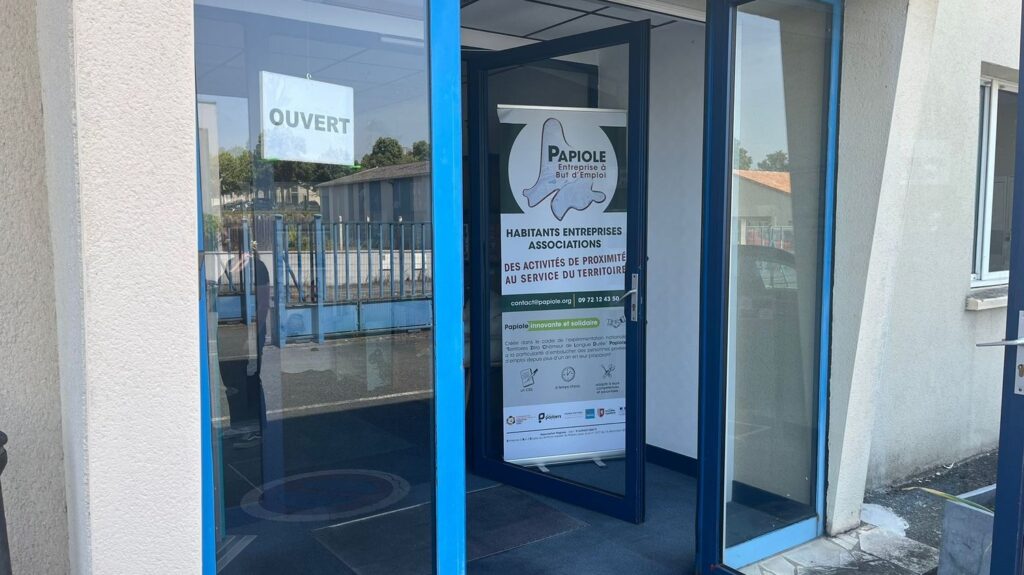While its sustainability remains uncertain, the Zero unemployed territory project continues its social mission. In Poitiers, former long -term unemployed find dignity and stability thanks to the united economy.
/2023/07/07/64a7df4c5fe71_placeholder-36b69ec8.png)
Published
Reading time: 5min
/2025/06/12/papiole-684af5edec9b3949727930.jpg)
A future in question. While examining the bill to perpetuate the experimentation zero -term zero -term territories This fall is postponed to this fall, the association which pilots this project holds its general assembly on Friday, June 13. The opportunity to take stock of this system launched in 2016, which aims to hire CDI in companies of the social and solidarity economy of people long deprived of employment. In nine years, more than 4,000 people have been recruited everywhere in France.
In Poitiers, Zero unemployed territories has created two companies, including Papiole, which is in particular a resourcery of toys. Behind his counter, Manu, 36, meticulously separates the different toys: “We will sort all the small parts. There the Barbie figurines and Action Man.” Five years ago, a work accident deprived him of his server job. “I had a handicap in my hand, I had an operation and suddenly, I have no right to wear more than ten kilos”he explains.
And then two years ago, after having alternated periods of unemployment and odd jobs, the Association Territoire Zéro unemployed long -term offers him a permanent contract at Papiole. “It is in contact with customers or distribute flyers, it is presenting events. It makes me proud because it makes me meaning in my life”tells Manu. He works 30 hours a week and now wants to spend his certificate of aptitude for safety driving (CACES), he hopes to be able to make an immersion in a big DIY business.
Papiole employees come from three disadvantaged districts in Poitiers, where the unemployment rate is twice as high as the national average. To get these inhabitants out of precariousness, the company recruits them whatever their level of training. A relief for Nathalie, 47 years old: “I left school to take care of my parents. It was difficult for work because I don’t know how to do a CV, the papers, I had trouble. As I registered in zero unemployed territories, I am happy, that I am coming.”
The company also adapts the schedules and positions to the constraints of employees. Among these employees, Axelle, 32 years old. She joined Papiole in 2023, after three years of unemployment and temporary. A very difficult period, remembers the young Poitevin: “When you apply a lot and you have no response or refusals, there is a little loss of self -confidence. It is complicated to live, you isolate ourselves because at the RSA, you do not necessarily have the means to have fun, to make outings.” Today she says she has “Find the smile” with his CDI which offers him a “Certain security in life”.
To be able to pay his hundred employees, Papiole needs public subsidies. Except that the envelope allocated by the State is down, alert Alexandre Motard, project manager of the zero unemployed territory in Poitiers: “We are worried. There is a real risk that, through a decrease in the contribution of the State, companies for employment aim must be in stronger profitability logics. And therefore this means that the primary object is no longer the question of employment.”
Its concern is all the stronger since the government has just issued reservations on this system whose cost amounts to 75 million euros this year. “It costs the state less to finance a job than to finance precariousnesssays Alexandre Motard. These people, they benefit from social benefits, family allowances; And it has a cost too. If we remove, all these costs in the end, it is not more expensive than allowing them to work. It’s really a choice of society: do we continue to merge people or do we want to give them dignity? “ The association now hopes to convince deputies who will have to examine at the start of the school year a bill aimed at perpetuating and extending the experiment.
Today, 47 departments have zero -term zero -term territories. Almost 80% of employees were unemployed for two years before their hiring in a business company (EBE), with more than half without a baccalaureate and 20% without any diploma.


